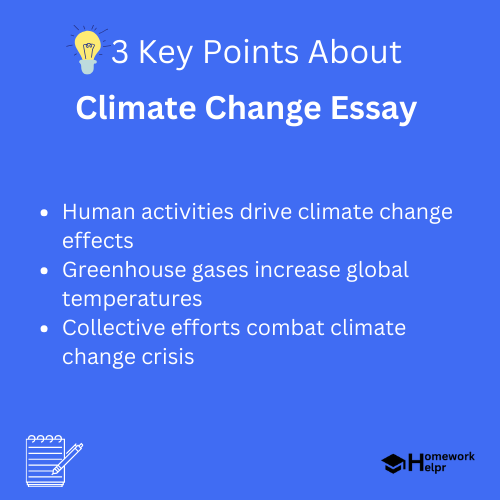📝 Summary
Climate change represents long-term shifts in temperature and precipitation, primarily caused by human activities like the burning of fossil fuels. This phenomenon results in serious effects such as increased temperatures, melting ice caps, and biodiversity loss. To combat climate change, individuals can engage in practices like reducing waste, using renewable energy, conserving water, and supporting sustainable methods. Understanding climate change allows us to take significant steps towards a healthier planet for future generations. Every action, no matter how small, contributes to this crucial endeavor.}
Understanding Climate Change: An Essay for Students and Children
Climate change is a significant phenomenon that affects our planet and the way we live. It refers to long-term alterations in temperature, precipitation, and other atmospheric conditions. The scientific consensus is clear: human activities, especially the burning of fossil fuels, are a major driver of recent climate changes. In this essay, we will explore what climate change is, its causes, effects, and the steps we can take to combat it.
What is Climate Change?
Climate change involves shifts in weather patterns lasting for an extended period, typically decades or longer. While the Earth has always experienced climate changes—such as the Ice Ages or periods of hot climates—the current crisis is largely driven by human influence. The Greenhouse Effect plays a critical role in this process.
The Greenhouse Effect happens when certain gases in the Earth’s atmosphere trap heat from the sun, creating a ‚Äúblanket” effect. These gases include carbon dioxide (CO‚ÇÇ), methane (CH‚ÇÑ), and nitrous oxide (N‚ÇÇO). While these gases are naturally occurring and help keep the planet warm enough to sustain life, human activities have significantly increased their concentrations.
Definition
Greenhouse Effect: The warming of Earth due to the trapping of heat by greenhouse gases in the atmosphere.
Causes of Climate Change
- Burning of Fossil Fuels: The primary source of increased greenhouse gas emissions. This includes coal, oil, and natural gas.
- Deforestation: Cutting down trees decreases the planet’s ability to absorb carbon dioxide, contributing to higher atmospheric CO‚ÇÇ levels.
- Agricultural Practices: Agriculture releases greenhouse gases such as methane through livestock digestion and nitrous oxide from fertilized soils.
- Industrial Activities: Factories and power plants emit vast amounts of greenhouse gases through energy consumption and waste production.
Effects of Climate Change
The consequences of climate change are profound and far-reaching. Here are some notable effects:
- Increased Temperatures: Average global temperatures have risen, resulting in unusually hot summers and changing seasonal patterns.
- Melting Ice Caps: Glaciers and ice sheets in polar regions are melting, leading to rising sea levels and threatened coastal communities.
- Extreme Weather Events: Climate change fuels hurricanes, droughts, floods, and other severe weather, greatly impacting human and wildlife habitats.
- Biodiversity Loss: Many species struggle to adapt or relocate to changing climates, leading to a potential extinction crisis.

Fun Fact About Climate Change
❓Did You Know?
The amount of CO‚ÇÇ in the atmosphere is the highest it’s been in over 800,000 years!
Combatting Climate Change
It’s crucial that we all do our part in fighting climate change. Here are some effective strategies:
- Reduce, Reuse, Recycle: Adopting a circular economy can significantly cut down on waste and decrease resource consumption.
- Use Renewable Energy: Switching to energy sources like wind, solar, and hydropower can lower greenhouse gas emissions dramatically.
- Conserve Water: Simple acts like fixing leaky taps, taking shorter showers, or collecting rainwater help to protect our precious water resources.
- Support Sustainable Practices: Choose products that are eco-friendly and support companies that prioritize sustainability.
Examples of Individual Actions
Examples
Walk or bike instead of driving to school, thus reducing carbon emissions from your vehicle.
Examples
Participate in local clean-up days to help reduce plastic pollution in your community.
Examples
Grow your own vegetables or plants in a garden, promoting sustainability and reducing reliance on store-bought goods.
Conclusion
Climate change is a daunting challenge that requires the immediate attention of individuals, communities, and governments around the world. By understanding its causes and effects, we can take significant steps towards combating this issue. Collective efforts, along with personal commitments to change our habits, can make a profound difference. Remember, every action counts—together, we can contribute to a healthier planet for future generations.
Related Questions on Climate Change Essay for Students and Children
What causes climate change?
Answer: Human activities like burning fossil fuels and deforestation contribute to climate change.
What are the effects of climate change?
Answer: Effects include rising temperatures, melting ice caps, and extreme weather events.
How can individuals help combat climate change?
Answer: Individuals can reduce waste, use renewable energy, and conserve water.
Why is the greenhouse effect important?
Answer: It traps heat in the atmosphere, maintaining Earth‚’ temperature for life.
